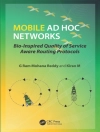A hands-on tutorial on multicast in third-generation
networks!
In this book, the authors describe how to perform multicast, the
one-to-many delivery of data to a group of destinations, in
third-generation mobile networks.
The authors provide an overview of the services that can be
realized with multicast in third-generation networks, describe the
mechanisms required to support these services and highlight the
performance of several multicast mechanisms. The focus of this book
is on multicast in UMTS and CDMA2000 networks, the dominant
third-generation network standards. In addition to describing the
standards for multicast, the authors also provide extensive
performance results of multicast in third-generation networks.
Key Features:
*Provides an in-depth review of the fundamentals of
multicast
*Describes in detail the MBMS and BCMCS standards for
multicast in UMTS and CDMA2000 networks, respectively
*Provides a comprehensive overview of the services that
can be realized with multicast in third-generation networks
*Highlights the performance of multicast in
third-generation networks
*Investigates how multicast can be achieved in
heterogeneous networks consisting of cellular and broadcast
networks
This book is an invaluable resource for professional engineers
and researchers working in the area of third-generation networks.
Postgraduate and graduate students on networking and communications
courses will also find this book an insightful and valuable
reference.
Inhaltsverzeichnis
Preface
1 Introduction
1.1 Cellular Mobile Communication Systems
1.2 Networks and Protocols
1.3 Multipoint Communications
1.4 IP Multicast
1.5 Multicast in Cellular Mobile Networks
1.6 Summary
2 Fundamentals of IP Multicast
2.1 Introduction
2.2 IP Multicast Service Models
2.3 Multicast Addressing and Address Management
2.4 Multicast Session Announcement
2.5 Group Management
2.6 IP Multicast Routing
2.7 Reliable Delivery of Multicast Traffic
2.8 Multicast Flow and Congestion Control
2.9 Multicast in Mobile and Wireless Networks
2.10 Summary
3 An Overview of Third-Generation Networks
3.1 Introduction
3.2 Radio Access and Networking in UMTS
3.3 Radio Access and Networking in CDMA2000
3.4 Summary
4 Multicast Services for Third-Generation Networks
4.1 Introduction 4.2 Motivation for Multicast
4.3 Multicast Services
4.4 User Requirements and Technology Acceptance
4.5 Summary
5 Multicast Extensions for Third-Generation Networks
5.1 Introduction
5.2 MBMS for UMTS
5.3 BCMCS for CDMA2000
5.4 Summary
6 Protocols and Mechanisms for MBMS
6.1 Introduction
6.2 MBMS Bearer Service Basics
6.3 MBMS Bearer Service Management
6.4 Routing on the MBMS Bearer Path
6.5 MBMS User Services
6.6 Summary
7 Protocols and Mechanisms for BCMCS
7.1 Introduction
7.2 BCMCS Bearer Path Architecture
7.3 BCMCS Bearer Service Management
7.4 BCMSC Service Layer
7.5 Summary
8 Multicast Capacity over the CDMA Air Interface
8.1 Introduction
8.2 PTP and PTM Channels for Multicast
8.3 System Model
8.4 Analysis of Multicast Capacity
8.5 Numerical Results
8.6 Summary
9 Cost Analysis of Multicast Routing
9.1 Introduction
9.2 Dynamic Multicast Routing for UMTS
9.3 Cost Analysis
9.4 Numerical Results
9.5 Summary
10 Reliable Multicast
10.1 Introduction
10.2 Loss Recovery for Reliable Multicast
10.3 Performance Evaluation Method
10.4 Reliable Multicast over the Air Interface
10.5 End-to-End Reliable Multicast
10.6 Summary
11 Mobile Multicast in Heterogeneous Networks
11.1 Introduction
11.2 Alternative Technologies for Mobile Multicast
11.3 Interworking and Convergence
11.4 Challenges for Multicast Delivery in Heterogeneous
Networks
11.5 Multicast Delivery Co-ordination in Heterogeneous
Networks
11.6 Summary
A Derivation of Downlink Capacity
A.1 Ratio of Inter-Cell Interference to Received Power
A.2 Derivation of Average Downlink Power Factor
A.3 Multicast Capacity with PTP Channels
A.4 Multicast Capacity with PTP Channels
B Cost Derivation of Multicast Routing
B.1 State Probabilities
B.2 Cost Variables
B.3 Packet Delivery Cost
B.4 Location Update Cost
Bibliography
Über den Autor
Robert Ruemmler currently works for Accenture AG, Switzerland as a consultant for leading Swiss banks. Robert holds a Ph D from King’s College London, United Kingdom (2005, Thesis: On the Distribution of Software to End-User Terminals in Third-Generation Mobile Networks). His research interests include Multicast in third-generation networks, IP multicast, software download to the mobile terminals, and software-defined radio. He has been actively collaborating with leading companies in mobile communications industry as part of European Commission-sponsored research projects.












